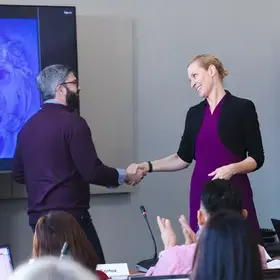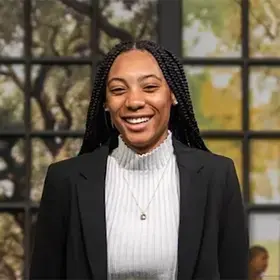By Sanaya Kriplani, M.S. in Sustainability Management Student, School of Professional Studies
As the world prepares for COP29 (the 29th session of the Conference of the Parties), a summit meeting of nations dedicated to addressing the pressing challenges of climate change, it’s disheartening to observe a persistent issue that continues to cast a shadow over these crucial discussions—namely, the absence of female representation in key roles.
Announced on January 13, 2024, the 28-member COP29 climate committee consisted of 28 men—and no women.
The COP series is a framework established by the United Nations Framework Convention on Climate Change, aiming to bring together representatives from nations worldwide to discuss and negotiate climate policies and make decisions that shape global responses to climate change. Its 29th session is scheduled to convene on November 11, 2024, in Azerbaijan.
Unsurprisingly, the announcement of the all-male committee was met with disappointment and backlash by various groups, with some even labeling it “regressive.” Following the criticism, the committee was then updated to include 29 men and 12 women on January 19, 2024. While this is still a long way off from a 50:50 ratio, what remains most alarming is that such an oversight in the initial development of the committee was even possible.
In an era in which conversations about inclusivity and diversity are at the forefront of global decision-making, the lack of women in these influential positions undermines the effectiveness and legitimacy of the COP process and makes me wonder: Are we moving forward at all?
The urgency of the climate crisis requires a collective and diverse approach. In a world where the impacts of climate change spare no one, how can we afford to exclude the perspectives and experiences of half the global population? As decisions are made that shape our collective response to the climate crisis, we cannot address the many challenges posed by climate change without the full and equal participation of women in crafting these solutions.
The climate crisis disproportionately affects women, who often bear the brunt of its impacts, from increased caregiving responsibilities during extreme weather events to heightened risks to maternal health and economic vulnerabilities due to climate-induced disruptions in agriculture. In 2021, the Malala Fund estimated that climate-related events will prevent at least 4 million girls in lower-income countries from finishing their education. Extreme weather has been forcing girls out of school, pushing them into earlier marriages, and increasing their exposure to violence. Recognizing these gender-specific challenges is crucial for developing comprehensive climate solutions. The COP29 panel’s initial lack of gender diversity underscores a systemic issue and reflects a stark gender disparity that cannot be ignored.
There exists a pool of qualified and experienced women who have dedicated their careers to climate science, policy, activism, and addressing the climate crisis. It is imperative that these voices be heard and incorporated into the decision-making processes of COP29. Research consistently highlights the positive correlation between gender diversity and effective decision-making. According to a study by McKinsey & Company, companies in the top quartile for gender diversity on executive teams are 25% more likely to experience above-average profitability. This data underscores the imperative to include women in decision-making bodies such as the COP29 climate committee to bring together the variety of experiences and viewpoints needed to develop more comprehensive and innovative solutions.
The absence of women is also a missed opportunity to harness the full breadth of perspectives, talent, and innovation needed to navigate the complexities of a changing climate. The lack of female voices on the COP29 panel not only perpetuates gender inequality but also risks overlooking critical aspects of climate action that directly affect women and vulnerable communities. Gender diversity is not just a matter of representation; it’s about ensuring that policies and strategies consider the diverse needs and experiences of all, irrespective of gender.
Addressing the gender disparity in COP29 panel representation requires a concerted effort from organizers, participating nations, and us, the public. While governments and organizations must actively nominate and support qualified women to take on leadership roles within the COP framework, ensuring their voices are heard and valued in shaping global climate policies, we must continue to raise our voices to call out inequality and bring about this change.
Dismantling existing barriers and fostering an environment that encourages and supports women in climate science, policy, and activism are vital. A quick fix like adding a few women to a panel that was meant to be representative of a global community, just to avoid negative press, is not enough. Recognizing that gender equality is both a matter of justice and a strategic imperative for a sustainable and resilient future, COP29 and other such global conferences must go beyond token representation. Creating spaces where diverse voices are genuinely valued, from speaker lineups to decision-making bodies, is crucial.
It is disheartening to know that so much backlash was needed to bring about this change. For a student in the Sustainability Management program at Columbia University, where the majority of my cohort is made up of women, it is demoralizing to think that there is no place for us outside the classroom. We must rally together, acknowledging the invaluable role women play in addressing the urgent challenges posed by climate change, and actively work toward a future where gender diversity is the norm rather than the exception. In doing so, we will pave the way for a more inclusive, innovative, and effective approach to combating the climate crisis.
Views and opinions expressed here are those of the authors, and do not necessarily reflect the official position of Columbia School of Professional Studies or Columbia University.
About the Program
The Columbia University M.S. in Sustainability Management program offered by the School of Professional Studies in partnership with the Climate School provides students cutting-edge policy and management tools they can use to help public and private organizations and governments address environmental impacts and risks, pollution control, and remediation to achieve sustainability. The program is customized for working professionals and is offered as both a full- and part-time course of study.


